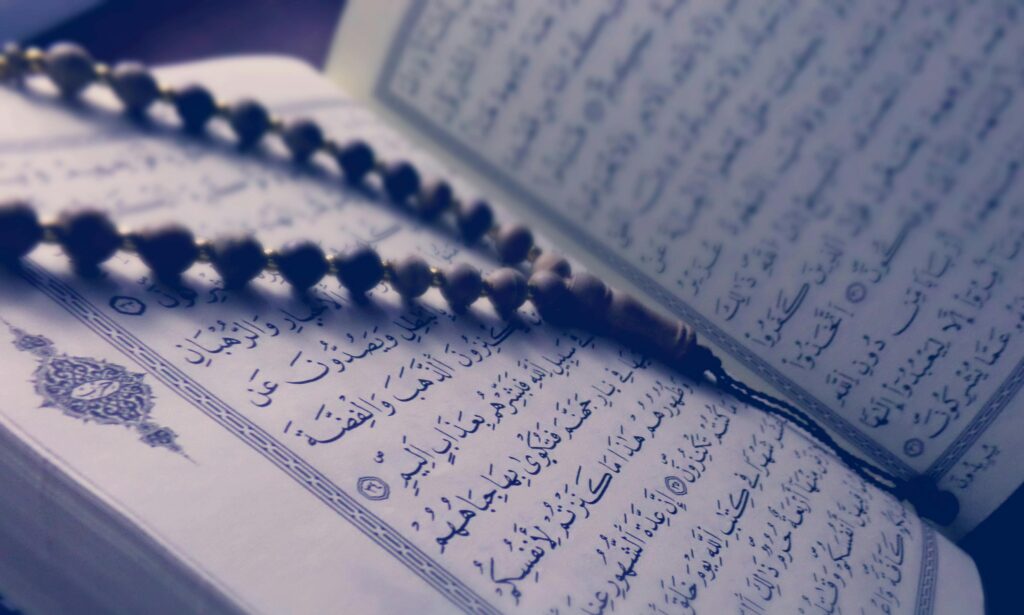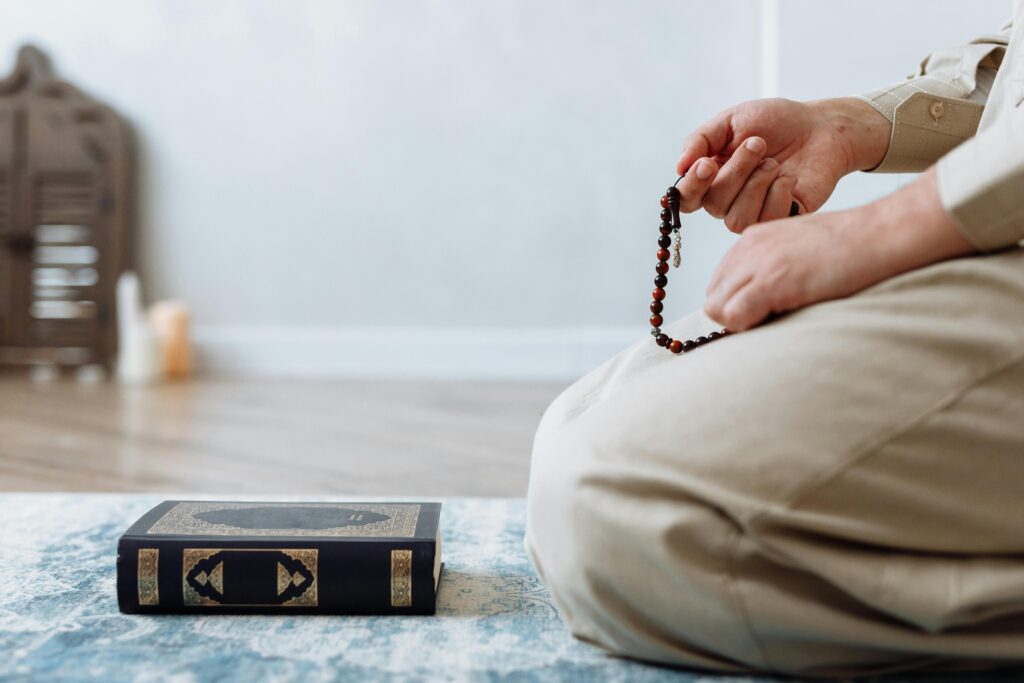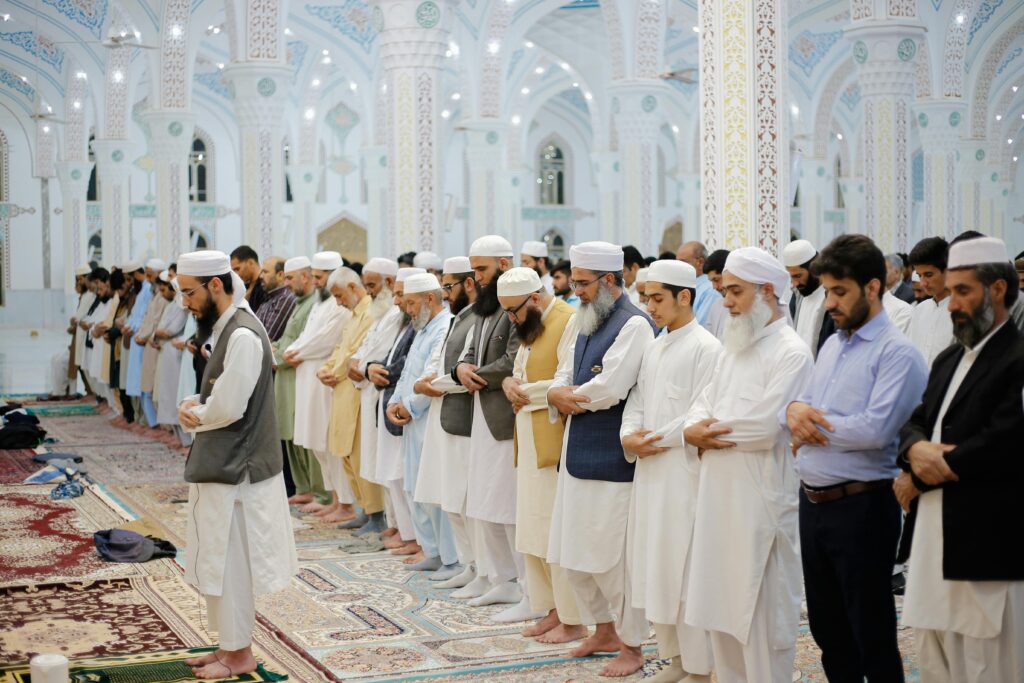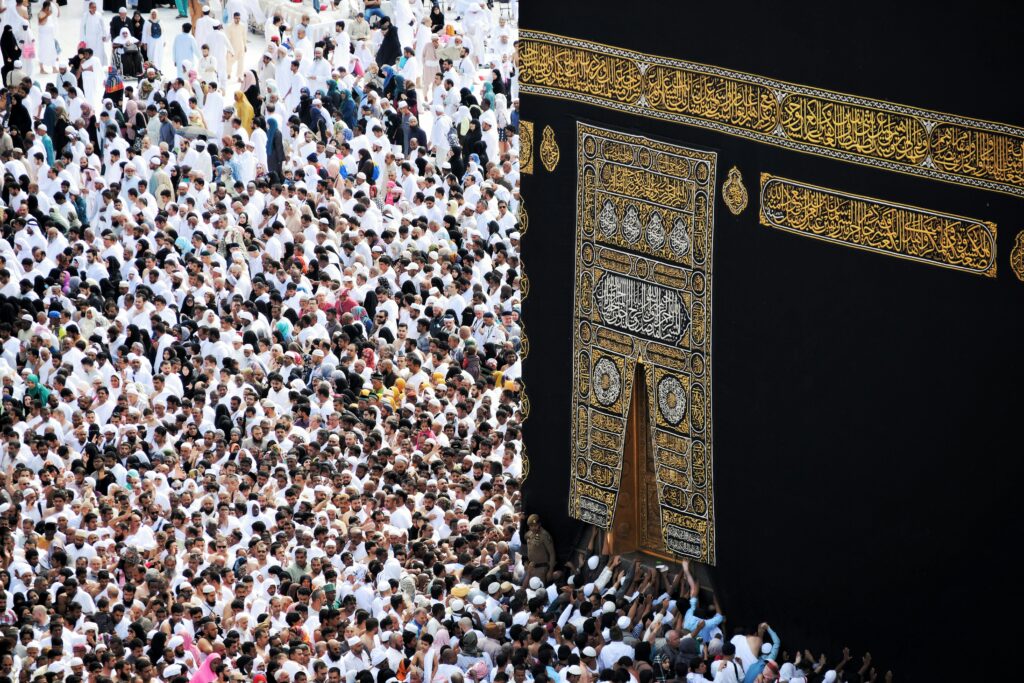Table of Contents
5 Pillars of Islam: Introduction
Islam, as one of the world’s major religions, guides the spiritual, ethical, and social conduct of over a billion people. At the heart of it, there are 5 pillars of Islam, fundamental acts of worship and devotion that define a Muslim’s faith and practices. These pillars are not merely rituals but are viewed as a framework for leading a life pleasing to Allah (God), encompassing both individual piety and social responsibility. Understanding the 5 pillars of Islam is essential for anyone seeking to comprehend Islam’s core teachings and the daily lives of Muslims. This blog aims to explore each pillar in depth, shedding light on their significance and the profound impact they have on a Muslim’s faith journey.

Shahada: Declaration of Faith
The first and perhaps most pivotal of the 5 Pillars of Islam is the Shahada, a simple yet profound declaration of faith. In Arabic, Shahada is:
“لَا إِلَٰهَ إِلَّا ٱللَّٰهُ مُحَمَّدٌ رَّسُولُ ٱللَّٰهِ”
This is pronounced as “la ilaha illa Allah, Muhammadur rasul Allah,” which translates to “I testify that there is no God but Allah and Muhammad is the messenger of Allah.” This declaration is the bedrock of Islam, encapsulating its monotheistic essence and the recognition of Muhammad as Allah’s final prophet.
There are 6 Kalimahs in Islam but you just need to offer the first Kalimah (Shahadah) to embrace Islam.
The Importance of Shahada
At its core, the Shahada is both an affirmation and a commitment. It affirms the monotheistic nature of Islam, emphasizing the worship of Allah as the sole deity. Furthermore, it commits the individual to follow the teachings and example of the Prophet Muhammad. For converts to Islam, reciting the Shahada in front of witnesses marks their formal entry into the faith, signifying a rebirth into a life dedicated to spiritual purity and righteousness.
Living by the Shahada
The implications of the Shahada extend far beyond its initial declaration. For Muslims, it is a guiding principle that influences every aspect of life. It fosters a sense of unity among Muslims, as this shared declaration bonds them to one another and to their faith. Living by the Shahada means prioritizing Allah’s will in decision-making, seeking to embody the virtues demonstrated by the Prophet Muhammad, such as compassion, honesty, and justice.
Moreover, the Shahada impacts daily acts of worship. It is echoed in the call to prayer (Adhan), reminding the faithful of their duties to Allah. It is also reflected in the practice of Salat (prayer), during which Muslims reaffirm their declaration of faith. This constant repetition of the Shahada serves as a spiritual anchor, keeping Muslims grounded in their faith amidst the complexities of daily life.

Salat: Prayer
Salat, the Islamic ritual prayer, is a fundamental pillar of Islam and an obligatory act of worship performed by Muslims five times a day. It is not only a means of keeping a believer in constant dialogue with Allah but also serves as a reminder of the faith’s principles and the believer’s submission to the divine will. Salat structures the day for Muslims, instilling discipline, and bringing moments of reflection and peace amidst the hustle of daily life.
The Significance of Salat
Salat is considered the most direct form of communication with Allah. Through it, Muslims express gratitude, seek guidance, and ask for forgiveness. It reinforces faith, dependence on Allah, and the brotherhood and equality of all Muslims, as everyone stands shoulder to shoulder in prayer, regardless of social status or ethnicity. The Prophet Muhammad referred to Salat as the pillar of religion and a light in the life of a Muslim, highlighting its crucial role in sustaining Islamic life.
The Five Daily Prayers
- Fajr – The dawn prayer, which is performed before sunrise, marks the start of the day with an act of devotion and intention.
- Dhuhr – The noon prayer, offered after the sun passes its zenith, brings a respite during the day to reconnect with Allah.
- Asr – The afternoon prayer, which helps to sustain the believer’s mindfulness of Allah into the late day.
- Maghrib – The evening prayer, performed just after sunset, serves as a moment to reflect on the day’s events and the beauty of creation.
- Isha – The night prayer, marking the day’s end, offers a final moment of reflection and connection with Allah before sleep.
Each prayer consists of units called Rak’ah, involving specific movements and recitations. The number of units varies with each prayer, from two in the Fajr to four in Dhuhr, Asr, and Isha, and three in Maghrib. The act of performing these prayers daily instills a sense of rhythm and spiritual discipline, emphasizing the centrality of faith in a Muslim’s life.
The Spiritual Benefits of Regular Prayer
Beyond the physical actions, Salat has profound spiritual implications. It purifies the heart, calms the soul, and brings the believer closer to Allah. Regular prayer is a constant reminder of a Muslim’s duties and purpose in life, serving as a moral compass and a source of strength. It is also a time for personal introspection, allowing for self-examination and spiritual growth. In times of joy, Salat is an expression of gratitude; in times of difficulty, it is a source of comfort and patience.
Moreover, Salat strengthens the community bond. Congregational prayers, particularly the Jumu’ah (Friday prayer), are a time for communal worship and social interaction, reinforcing the unity and equality of the Ummah (global Muslim community).

Zakat: Almsgiving
Zakat, the third pillar of Islam, is the compulsory giving of a set proportion of one’s wealth to charity. It is considered both a form of worship and a means of ensuring the economic welfare of the Muslim community. By purifying wealth through the act of giving, Muslims cleanse their souls of greed and selfishness, drawing closer to Allah.
The Concept and Importance of Zakat
Zakat is more than just charitable giving; it is a duty to Allah and a right of the poor and needy. The term itself comes from the Arabic root meaning “to purify” and “to grow.” It embodies the idea that wealth is purified by setting aside a portion for those in need, leading to increased blessings from Allah. Zakat is obligatory on all Muslims who meet the necessary criteria of wealth, known as Nisab, calculated as the equivalent value of 85 grams of gold or 595 grams of silver.
Calculation and Distribution of Zakat
The amount of Zakat to be paid is typically 2.5% of a Muslim’s total savings and wealth above the Nisab threshold, held for a lunar year. This includes cash, gold, silver, and assets or investments that generate income. Zakat is not levied on personal items, such as one’s home or car, which are not considered sources of wealth generation.
The distribution of Zakat is strictly defined within Islamic law, designated to eight categories of beneficiaries, including the poor, the needy, those in debt, and those working to distribute Zakat. This ensures that Zakat serves as an effective tool for social welfare and economic justice, reducing inequality and providing a safety net for the less fortunate.
The Impact of Zakat on Community and Society
Zakat has a profound impact on both individual believers and the wider community. It fosters a sense of responsibility towards the less fortunate, promoting social cohesion and solidarity. By redistributing wealth, Zakat helps alleviate poverty and can contribute to the economic development of the community. It reminds Muslims of the blessings they have received from Allah and encourages them to use their wealth responsibly and ethically.

Sawm: Fasting during Ramadan
Sawm, or fasting during the month of Ramadan, is the fourth pillar of Islam. Muslims abstain from food, drink, smoking, and marital relations from dawn until sunset. The fast is a means of spiritual purification, self-discipline, and empathy for the less fortunate.
The Significance of Ramadan and Fasting
Ramadan is the ninth month of the Islamic lunar calendar, believed to be the month in which the Quran was revealed to the Prophet Muhammad. Fasting during Ramadan is mandatory for all adult Muslims, except those who are ill, traveling, elderly, pregnant, breastfeeding, menstruating, or suffering from a chronic disease.
The fast of Ramadan is not just about abstaining from physical needs; it is a time for deep spiritual reflection, increased devotion, and worship. Muslims are encouraged to read the Quran, perform extra prayers, and engage in acts of charity. The fast is an exercise in self-restraint, intended to cleanse the soul and free it from harmful impurities.
Spiritual and Physical Benefits of Fasting
The spiritual benefits of fasting are manifold. It instills a sense of empathy for the less fortunate, fosters a community spirit through shared experience, and enhances personal discipline and self-control. Physically, fasting can lead to detoxification and a break for the digestive system.
Eid-ul-Fitr: Celebrating the End of Ramadan
The conclusion of Ramadan is marked by the celebration of Eid-ul-Fitr, one of Islam’s two major festivals. This day begins with a special communal prayer and is a time for Muslims to express gratitude to Allah for the strength to complete the fast. It is also an occasion for giving to the poor (Zakat al-Fitr), visiting friends and family, and celebrating the blessings of life.

Hajj: Pilgrimage to Mecca
The Hajj, the pilgrimage to Mecca, is the fifth and final pillar of Islam. It is a duty for all Muslims to perform at least once in their lifetime, provided they have the physical and financial ability to undertake the journey.
The Obligation and Spiritual Significance of Hajj
Hajj occurs during the Islamic month of Dhu al-Hijjah and involves a series of rituals performed over several days in and around the holy city of Mecca, including the circling of the Kaaba, the standing on the plains of Arafat, and the stoning of pillars representing the devil. These rituals commemorate the actions of the Prophet Ibrahim, his wife Hajar, and their son Ismail, and symbolize the unity of the Muslim Ummah in submission to Allah.
The Rituals Performed During Hajj
The rituals of Hajj serve to renew a Muslim’s sense of purpose in the world and their devotion to Allah. Pilgrims wear simple, white garments, symbolizing human equality and humility before God. The culmination of the Hajj is Eid al-Adha, the Festival of Sacrifice, which is celebrated by Muslims worldwide to commemorate Ibrahim’s willingness to sacrifice his son in obedience to Allah.
The Personal Transformation Through Hajj
For many Muslims, Hajj is a life-changing experience. It is an opportunity for forgiveness and a new beginning. The challenges and rigors of the pilgrimage, combined with the intense spiritual communion and camaraderie with millions of other Muslims, can deepen one’s faith and transform one’s life.

5 Pillars of Islam: Conclusion
The 5 Pillars of Islam—Shahada, Salat, Zakat, Sawm, and Hajj—form the foundation of a Muslim’s faith and practice. They guide the believer in their journey through life, providing a framework for worship and conduct that is both personal and communal. Through the 5 pillars of Islam, Muslims develop a deep relationship with Allah, a disciplined lifestyle, and a sense of responsibility towards the wider community. The 5 Pillars of Islam thus not only unify Muslims around the world but also invite them to a life of purpose, discipline, and service.
FAQ Section
What are the 5 Pillars of Islam?
The 5 Pillars of Islam are the foundation of a Muslim’s faith and practice, comprising Shahada (faith), Salat (prayer), Zakat (almsgiving), Sawm (fasting during Ramadan), and Hajj (pilgrimage to Mecca). These pillars guide Muslims in their daily lives, fostering a close relationship with Allah and a sense of community among believers.
Why is Zakat important in Islam?
Zakat, or almsgiving, is important in Islam because it is a form of worship and a means of purifying one’s wealth. By giving a portion of their wealth to those in need, Muslims cleanse their souls of greed and selfishness, promote economic justice, and ensure the welfare of the community.
Can anyone fast during Ramadan?
All adult Muslims are required to fast during Ramadan, except for those who are ill, traveling, pregnant, breastfeeding, menstruating, or suffering from a chronic illness. The fast includes abstaining from food, drink, smoking, and marital relations from dawn until sunset.
What is the significance of the Hajj pilgrimage?
The Hajj pilgrimage to Mecca is significant as it is one of the 5 Pillars of Islam and a duty for all Muslims to perform at least once in their lifetime if they are physically and financially able. It represents the unity of the Muslim Ummah and the submission to Allah. The rituals of Hajj commemorate the actions of the Prophet Ibrahim and his family and serve as a profound spiritual journey for believers.
How do the 5 Pillars of Islam influence a Muslim’s life?
The 5 Pillars of Islam deeply influence a Muslim’s life by providing a framework for their faith and practice. They instill discipline, foster a sense of community, and enhance the individual’s relationship with Allah. Through these pillars, Muslims learn to lead lives of devotion, righteousness, and service to others.

